Viral News
U.S.-Iran Nuclear Talks Live: Indirect Talks Begin in Oman
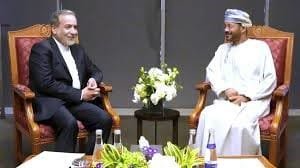
Contents
Introduction to the U.S.-Iran Nuclear Negotiations
The historical context of U.S.-Iran relations is deeply rooted in a series of complex socio-political events that have unfolded over several decades. The 1979 Iranian Revolution marked a significant turning point, leading to the severance of diplomatic ties and the establishment of an adversarial relationship that continues to evolve. Following this, the U.S. imposed a range of sanctions on Iran, particularly in response to its nuclear ambitions, which have long been a point of contention between the two nations.
Nuclear negotiations gained prominence in the early 2000s, culminating in the 2015 Joint Comprehensive Plan of Action (JCPOA), which sought to limit Iran’s nuclear program in exchange for sanctions relief. This agreement represented a key diplomatic achievement, yet it was marred by significant challenges, including U.S. withdrawal from the deal in 2018 under the Trump administration. This exit, coupled with the reinstatement of stringent sanctions, exacerbated tensions and raised concerns about Iran potentially accelerating its nuclear activities.
The current phase of U.S.-Iran nuclear negotiations, which has transitioned into indirect talks taking place in Oman, reflects an effort to revive diplomatic engagement. Oman’s role as a mediator stems from its historical neutrality and trusted relationship with both Washington and Tehran. The significance of these discussions cannot be overstated; they represent a critical opportunity to de-escalate tensions and work towards a sustainable resolution to the nuclear issue, which poses risks not only to regional stability but also to global security at large.
Key Players Involved in the Talks
The U.S.-Iran nuclear talks are characterized by the involvement of several crucial players, each with distinct roles and interests in the ongoing negotiations. At the forefront are the diplomats representing the United States and Iran, who are tasked with navigating a complex array of geopolitical concerns and historical tensions. U.S. diplomats, aiming to ensure national security and regional stability, have been particularly focused on curbing Iran’s nuclear ambitions, advocating for a framework that restricts Tehran’s ability to develop nuclear weapons while allowing for monitoring and verification measures.
On the other hand, Iranian diplomats are focused on lifting sanctions and ensuring the nation’s right to enrich uranium for peaceful purposes under international law. They seek acknowledgment of Iran’s interests and security concerns, often emphasizing the need for mutual respect and understanding in negotiations. This dynamic sets the stage for a dialogue where both sides attempt to reconcile differing objectives.
In addition to the key players from the U.S. and Iran, other nations and organizations play a significant role in these talks. The European Union, as the architect of earlier agreements such as the Joint Comprehensive Plan of Action (JCPOA), serves as a mediator, facilitating discussions and providing a platform for dialogue between the two countries. European diplomats often serve to bridge the gap between U.S. objectives and Iranian expectations, promoting a balanced approach to the negotiations.
Furthermore, various Gulf States, including Saudi Arabia and the United Arab Emirates, express keen interest in the outcomes of these talks. Their involvement stems from concerns regarding regional security and the potential proliferation of nuclear weapons. These countries have historically expressed apprehension about Iran’s nuclear program and vigorously advocate for measures that limit its capabilities. Overall, the interplay of these key players is crucial in influencing the trajectory of the U.S.-Iran nuclear talks and shaping potential outcomes.
Objectives of the Indirect Talks
The ongoing indirect talks between the United States and Iran in Oman revolve around several critical objectives, which both nations hope to address through these negotiations. A primary aim of these discussions is the potential lifting of economic sanctions that have been imposed on Iran since 2018. The U.S. government seeks to strike a balance between ensuring that Iran remains in compliance with non-proliferation commitments and providing economic relief to the Iranian populace, who have faced increased hardship as a result of these sanctions. The discussions serve as a platform for addressing the impacts of sanctions and exploring avenues for their gradual removal in exchange for verified commitments from Iran regarding its nuclear activities.
Another essential objective lies in reinforcing the framework of nuclear non-proliferation. Both countries are acutely aware of the risks posed by deficient nuclear oversight. Therefore, establishing mutually agreeable terms to ensure Iran’s compliance with the Joint Comprehensive Plan of Action (JCPOA) is crucial. This involves not only curbing Iran’s uranium enrichment but also implementing robust inspection regimes by the International Atomic Energy Agency (IAEA) to maintain transparency and trust. Such measures can foster a foundation of cooperation, addressing concerns about nuclear proliferation while emphasizing diplomatic engagement.
Moreover, a significant goal of the indirect talks is to lay the groundwork for future diplomatic initiatives. Building a sustainable dialogue framework is vital for addressing not only nuclear issues but also regional security concerns, including Iran’s influence in the Middle East. By creating a consistent channel for communication, both nations seek to prevent misunderstandings and conflicts that may arise from divergent strategic interests. Through these objectives, the U.S.-Iran indirect talks aim to pave the way for a more secure and stable geopolitical landscape in the region.
Timeline of the Current Negotiations
The series of negotiations regarding Iran’s nuclear program has evolved significantly since the initial discussions commenced. The timeline of these talks encompasses crucial dates and pivotal developments that have shaped the current situation. It is essential to understand the context and progression of these negotiations, particularly in light of their implications for regional stability and international relations.
In April 2021, indirect talks began between the United States and Iran in Vienna, facilitated by the other signatories of the Joint Comprehensive Plan of Action (JCPOA). These discussions aimed to restore the 2015 agreement, which was significantly undermined after the U.S. withdrawal in 2018. As negotiations unfolded, various stages featured notable announcements, including Iran’s incremental advancements in its nuclear capabilities.
The situation took a critical turn in June 2021, when Iran elected a new president, Ebrahim Raisi. This event raised concerns over the future of the negotiations, as Raisi’s administration signaled a more hardline approach. Despite these challenges, talks resumed in November 2021 after several months of stalled discussions, allowing both parties to reassess their strategies and objectives.
By early 2022, significant obstacles emerged as Iran sought to expand its demands, which complicated the negotiation dynamics further. Notably, Iran’s insistence on the removal of certain sanctions before compliance with nuclear restrictions served to heighten tensions between involved parties. In early 2023, indirect talks moved to Oman, providing a new venue for discussions aimed at de-escalating tensions and bridging gaps between negotiating parties.
This timeline highlights the intricate nature of U.S.-Iran nuclear negotiations, characterized by shifts in strategy and reactions to political changes. As the situation continues to evolve, understanding these developments will be vital for comprehending the broader implications for global security and diplomatic efforts.
Challenges and Obstacles in the Negotiations
The ongoing U.S.-Iran nuclear negotiations are fraught with multifaceted challenges and obstacles that complicate the pursuit of a diplomatic resolution. Foremost among these are political tensions that exist not only between the two nations but also within their respective regions. The historical animosities and geopolitical rivalries, particularly in the Middle East, create an environment ripe for misunderstandings and conflict. These regional tensions often manifest as a reluctance to cooperate on shared goals, particularly regarding nuclear capabilities, and can impede the trust necessary for successful negotiations.
Furthermore, there are significant domestic pressures that both parties must contend with. In the United States, political divisions often shape foreign policy, especially regarding Iran, where advocacy for hardline stances can undermine efforts towards diplomatic engagement. Similarly, in Iran, the political landscape is influenced by factions that may oppose compromises with the West, particularly over nuclear issues. These internal dynamics affect leadership decisions and prioritize nationalistic narratives that complicate the negotiation process.
Additionally, economic challenges emerge as an obstruction to progress. The imposition of sanctions on Iran by the U.S. and its allies has devastated the Iranian economy, leading to heightened urgency on Iran’s part for sanctions relief. However, the U.S. is cautious about lifting sanctions without assurances that Iran will comply with nuclear restrictions. This duality of need—economic recovery for Iran and security reassurances for the U.S.—creates a complex bargaining context where both sides must find common ground amid divergent priorities.
Ultimately, the path to a successful negotiation is paved with these significant challenges, rooted in political, economic, and ideological discrepancies. Addressing these obstacles will require nuanced diplomacy and a commitment to understanding the broader implications of their nuclear discourse.
Potential Outcomes of the Talks
The ongoing U.S.-Iran nuclear talks, which have recently commenced in Oman, present a complex landscape of potential outcomes that could significantly impact international relations and regional stability. One possible scenario is that these negotiations yield constructive results, leading to renewed agreements that could effectively restrain Iran’s nuclear ambitions and ensure compliance with past commitments. A successful resolution could foster an atmosphere of cooperation, possibly paving the way for further diplomatic engagements on issues like human rights and regional security.
Conversely, it is also plausible that the talks could stall, resulting in a continuation of existing tensions between the two nations. In this scenario, the absence of a definitive agreement may lead to a gradual deterioration of relations, as both sides remain entrenched in their positions. This stalemate could provoke an arms race in the region, as neighboring countries may perceive Iran’s nuclear capabilities as a direct threat and feel compelled to enhance their own defense mechanisms.
Moreover, setbacks during the negotiations could exacerbate hostilities, potentially sparking military confrontations or cyber attacks aimed at disrupting nuclear facilities. The international community remains deeply concerned about the ramifications of a breakdown in discussions. Such an outcome would not only affect U.S.-Iran relations but could have wider implications for global security, as it might embolden hardline factions within Iran and diminish prospects for future diplomacy.
Given these dynamics, it is crucial for all parties involved to approach the talks with a commitment to negotiation while recognizing the stakes involved. Heightened scrutiny from global powers and regional allies will likely play a pivotal role in shaping the trajectory of these discussions and determining which outcome ultimately materializes.
International Reactions to the Talks
The commencement of indirect talks between the United States and Iran in Oman has elicited a varied range of reactions from the international community. These negotiations are pivotal, given their potential to alter the geopolitical landscape and address long-standing concerns regarding Iran’s nuclear ambitions. Notably, U.S. allies in Europe have expressed cautious optimism. Countries such as France and Germany, who were instrumental in the original 2015 nuclear deal, underscore the necessity of diplomatic engagement as a means to prevent nuclear proliferation. They view the talks as a potential pathway to a new agreement that would detail Iran’s nuclear capabilities while ensuring regional stability.
Conversely, nations that have historically opposed U.S. involvement in Middle Eastern affairs, such as Russia and China, exhibit a more critical stance. These countries emphasize the importance of a multilateral approach and call for inclusive dialogue that includes regional players. They argue that any agreement reached should not only focus on Iran’s nuclear program but also address broader security concerns in the Middle East. The wary stance of both adversarial and supportive nations indicates a global recognition of the talks’ complexities and potential ramifications.
International organizations, such as the United Nations, have highlighted the significance of these negotiations. The UN Secretary-General has stated that dialogue is essential for de-escalating tensions and ensuring compliance with international laws regarding nuclear activities. This view is echoed by various non-governmental organizations advocating for nuclear disarmament and peace in the region. They believe that diplomacy, when pursued earnestly, can lead to meaningful outcomes that benefit not just Iran, but the international community at large, by reducing the risk of nuclear conflict.
The Role of Oman in Mediating Talks
Oman has long positioned itself as a crucial mediator in diplomatic discussions within the Middle East, particularly in matters involving the U.S. and Iran. Historically, the Sultanate of Oman has maintained a policy of neutrality, which has enabled it to foster relationships with various nations, including those that are often at odds, such as the United States and Iran. This unique diplomatic stance has facilitated Oman’s role as a facilitator in indirect negotiations where tensions are high, and dialogue is essential.
One of the critical advantages of Oman’s neutrality is its ability to engage both parties without the baggage of preconceived biases. Unlike many of its regional counterparts, Oman has refrained from publicly taking sides in contentious disputes. This approach has garnered trust from all involved parties, allowing Oman to serve as a constructive intermediary. As the U.S. and Iran continue their complex negotiations, Oman’s neutrality provides a conducive atmosphere for dialogue, essential for resolving contentious issues surrounding Iran’s nuclear ambitions.
Additionally, Oman’s geographical location enhances its suitability as a venue for these talks. Nestled at the southern entrance of the Strait of Hormuz, a vital shipping route for oil, Oman has geographic importance that underscores its strategic role in regional diplomacy. The country has often hosted various diplomatic initiatives, and its leaders have developed a reputation for fostering constructive dialogue. This makes Oman an attractive site for the U.S.-Iran nuclear talks, where both parties can feel secure engaging in discussions that could influence the balance of power in the region.
In conclusion, Oman’s historical commitment to neutrality, combined with its strategic geographical position, underscores its important role in mediating the U.S.-Iran nuclear discussions. This diplomatic engagement not only reflects Oman’s aspirations to be a peace broker in a tumultuous region but also highlights the necessity of dialogue in addressing critical security challenges.
Summary and Future Implications
As we approach the end of the current phase of U.S.-Iran nuclear talks, it is crucial to reflect on the significant developments and the context in which these discussions have taken place. The indirect talks held in Oman represent a strategic move, highlighting a renewed commitment from both nations to seek common ground regarding Iran’s nuclear program. The diplomatic engagement forms a vital component of addressing longstanding tensions and lays the groundwork for potential future agreements that could alter the trajectory of U.S.-Iran relations.
The importance of these negotiations extends beyond the bilateral dynamics between the U.S. and Iran. The implications resonate across the broader Middle Eastern geopolitical landscape. Should the talks lead to a mutually acceptable framework, they may serve as a catalyst for improved relations not only between the U.S. and Iran but also among other regional players who have been closely monitoring the developments. Countries across the Middle East are acutely aware of how nuclear capabilities can shift power balances and influence security arrangements in the region.
Also read : Iran’s Pursuit of a ‘Real and Fair’ Deal in Nuclear Talks with the US
Furthermore, successful diplomacy around the nuclear issue could open avenues for addressing other critical matters, such as regional security concerns and economic sanctions. Sustained dialogue is imperative, as it fosters an environment for collaborative problem-solving that can yield numerous benefits, including stability and peace in a historically tumultuous region. Moving forward, it will be essential for both Iran and the U.S. to remain committed to constructive engagement, as this approach not only holds promise for their bilateral relationship but also for the broader aspirations of peace and stability in the Middle East.
Crime
Principal Arrested After Student’s Suicide Attempt in Odisha College Over Sexual Harassment Complaint
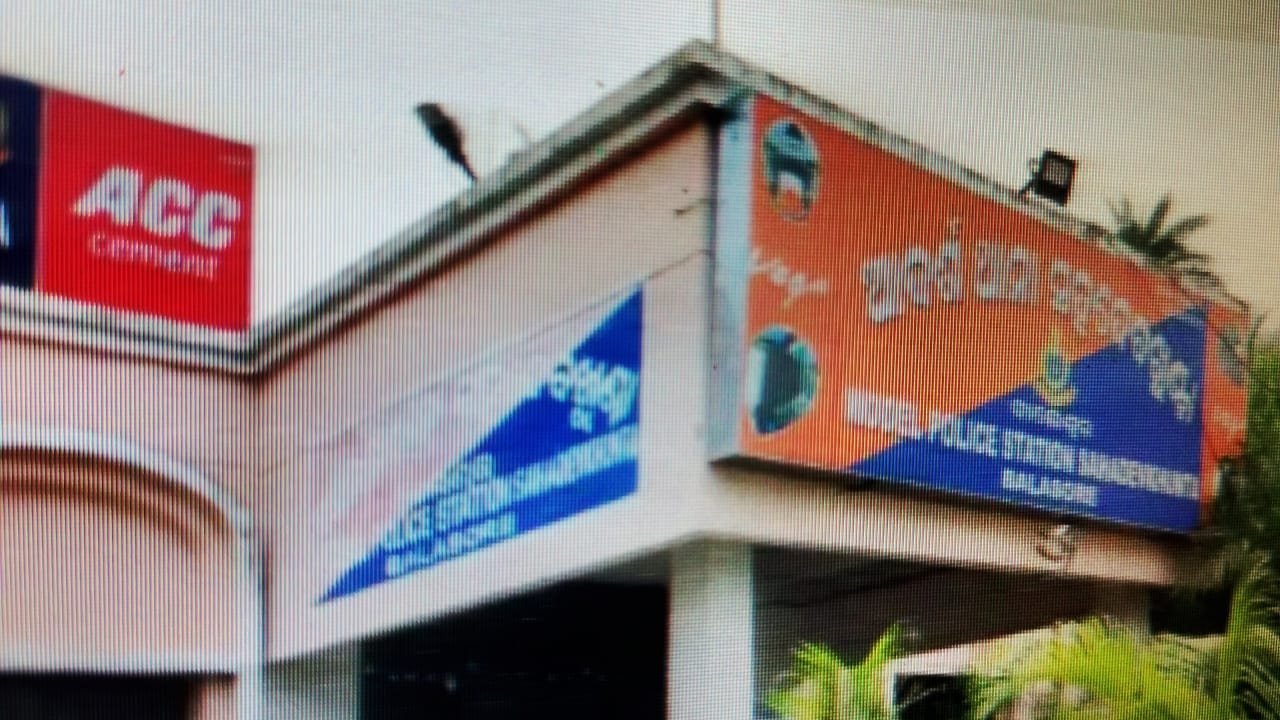
Odisha, July 14,2025
In a shocking development from Balasore, Odisha, the principal of Fakir Mohan College, Dilip Kumar Ghosh, has been arrested by Sahadevkhunta Police following a student’s suicide attempt on campus.
The arrest comes after a female student of the college allegedly attempted suicide on Saturday, accusing a faculty member of sexual harassment. The student is currently in critical condition and receiving treatment at AIIMS Bhubaneswar.
Confirming the arrest, Balasore Superintendent of Police, Raj Prasad, told BBC that the principal was taken into custody for his alleged negligence in handling the student’s repeated complaints.
According to the victim’s family, the girl had been subjected to ongoing sexual harassment for several months. Despite lodging a formal complaint with the college authorities, no meaningful action was taken. Frustrated and distressed by the college’s inaction, the student reportedly attempted to take her own life.
The family had been demanding the arrest of the principal, alleging that he failed to take timely and appropriate action. They also accused the college’s internal inquiry committee of trying to protect the accused teacher, instead of supporting the victim.
Earlier, the police had arrested the Head of the Department (HoD) of the Education Department, Sameer Kumar Sahu, who is the prime accused in the sexual harassment case.
On Sunday, Odisha Chief Minister Mohan Charan Majhi addressed the issue, stating,
“An investigation is underway to understand the full circumstances of the incident. The government will ensure strict action is taken against those responsible.”
The incident has sparked widespread outrage, highlighting the urgent need for stricter enforcement of sexual harassment protocols within educational institutions.
International
What Did Trump Say About Taiwan That Sparked Questions About America’s Global Role?
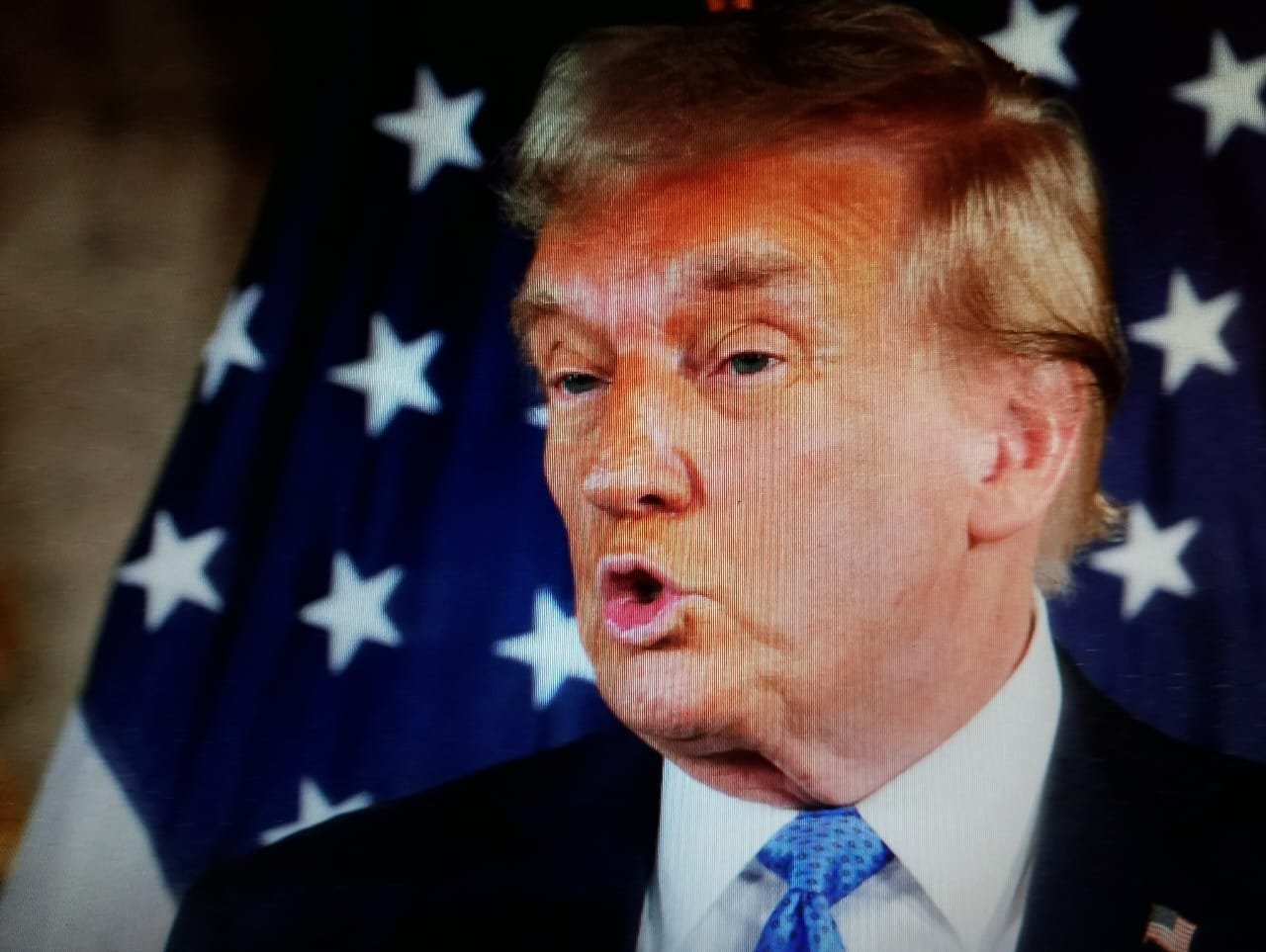
USA, July14,2025
A recent comment related to Taiwan has once again placed the United States under scrutiny on the global stage.
While former U.S. President Donald Trump has repeatedly urged allied nations not to rely solely on America for their security, a fresh statement by U.S. Defense Secretary Pete Hegseth has reignited debate. Hegseth openly admitted that China indeed poses a real threat to Taiwan.
This has raised a crucial question:
If China were to launch a military offensive against Taiwan, to what extent would the United States be willing to step in for its defense?
This comes at a time when U.S.-China trade tensions appear to have cooled down, and Washington is increasingly entangled in conflicts in the Middle East.
Trump’s earlier stance—encouraging allies to take responsibility for their own defense—has already unsettled several global partners. Now, with America’s most powerful trading rival, China, in direct contention over Taiwan, the world is watching to see how far the U.S. is prepared to go.
As geopolitical dynamics shift, the Taiwan question continues to test America’s commitment to its allies—and its global leadership.
Environment
Literature and Environment Are Both Sources of Sensitivity”Tree is Life: Grand Celebration of ‘Ek Ped – Sampark Ke Naam’ and Poetry Recitation on Environment
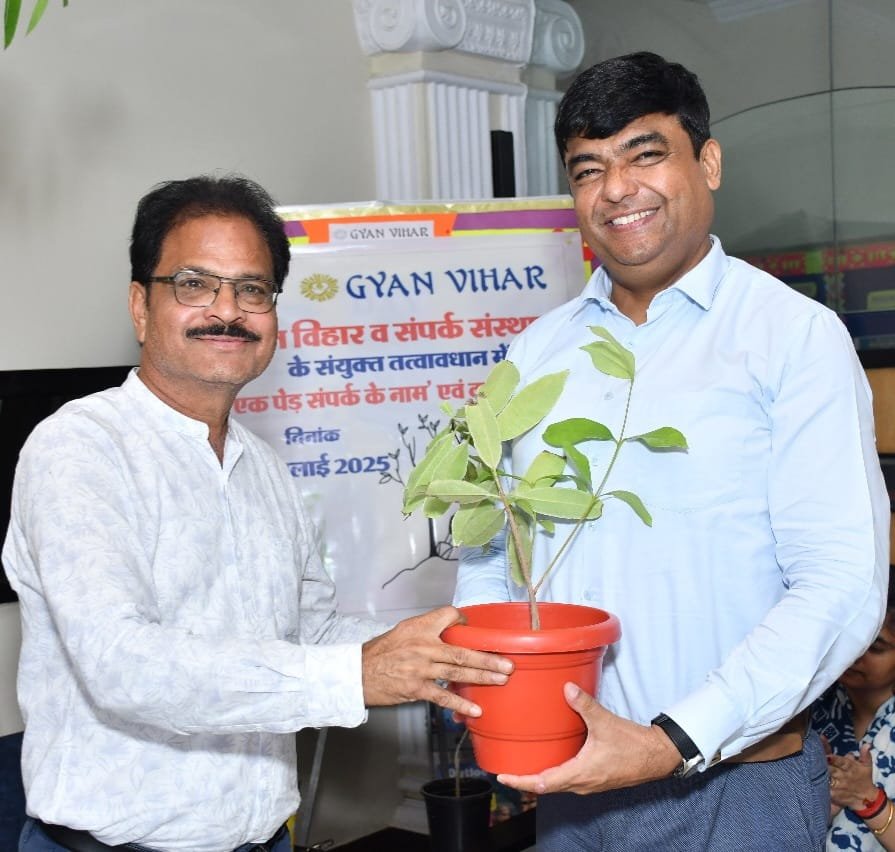
Jaipur, July 14,2025
A Heartfelt Environmental and Literary Initiative by Sampark Sansthan Receives Overwhelming Response at Gyan Vihar School Campus Jaipur.
The joint initiative of Sampark Sansthan and Gyan Vihar School, titled ‘Ek Ped – Sampark Ke Naam’, along with an environmental poetry recital, turned out to be a meaningful confluence of ecological awareness and literary sensibility. Students, teachers, poets, and social workers participated in the event with deep enthusiasm and emotional engagement.
Welcoming everyone, Sampark Sansthan President Anil Ladha remarked,
“This is not just an event, it’s an attempt to connect life and society through tree plantation. We want every individual to nurture a tree as lovingly as they would nurture a relationship.”
Dr. Ritvij Gaur (Principal), present as a special guest, emphasized in his speech,
“Trees are the foundation of our culture and survival. Teaching children to emotionally connect with nature through tree planting is the need of the hour.”

Sampark Sansthan General Secretary and Coordinator Renu ‘Shabdmukhar’ touched hearts with her words,
“This initiative aims to instill in students a sense of responsibility and the spirit of coexisting with trees. When nature and poetry walk together, society becomes truly awakened.”
Veteran poet Prof. Prabodh Govil inspired the audience, stating,
“Literature and environment are both profound sources of human sensitivity.”
Renowned writer Dr. Jayshree Sharma added,
“Trees don’t just give us oxygen, they teach us life values. A poem, a plant, and a thought — these can together change the world.”
Inspiring the young generation, senior poet Anshu Harsh quoted,
“When you walk ahead, many will follow.”
Usha Rastogi’s positive presence brought an energetic vibe to the event.
Program Coordinator Himadri Samarth expressed that,
“No matter what name we give to the campaign, the aim remains the same – to protect the environment.”
He concluded by thanking all the distinguished guests for their participation and support.
The event was beautifully hosted by Seema Walia, whose graceful voice, articulate language, and emotional tone left a lasting impact on everyone present.
The active participation of Gyan Vihar students made the event truly vibrant. When tiny hands touched the soil and planted saplings, it was more than an activity — it became a symbol of emotional bonding with nature.
Students like Charul, along with senior poets — Dr. Neelam Kalra, Renu Shabdmukhar, Himadri, Dr. Kanchana Saxena, Sonal Sharma, Dr. Anju Saxena, Avinash Joshi, Dr. Punita Soni, Kavita Mathur, S. Bhagyam, Rao Shivraj, Dr. Deepali, Vijayalakshmi, Sushila Sharma, Sushma Sharma, Meena Jain, Mahesh Sharma, and Nisha Jha — delivered powerful poetic performances centered on environmental consciousness. The students not only listened but also absorbed the essence of literature as a tool for raising awareness about nature.
The event sent a strong message — if the young generation connects with nature today, the future will be safe, beautiful, and full of hope.
Art
Sattva, Rajas, Tamas” Come Alive on Canvas – Dr. Renu Shahi’s Indian Philosophical Art Shines in Sri Lanka
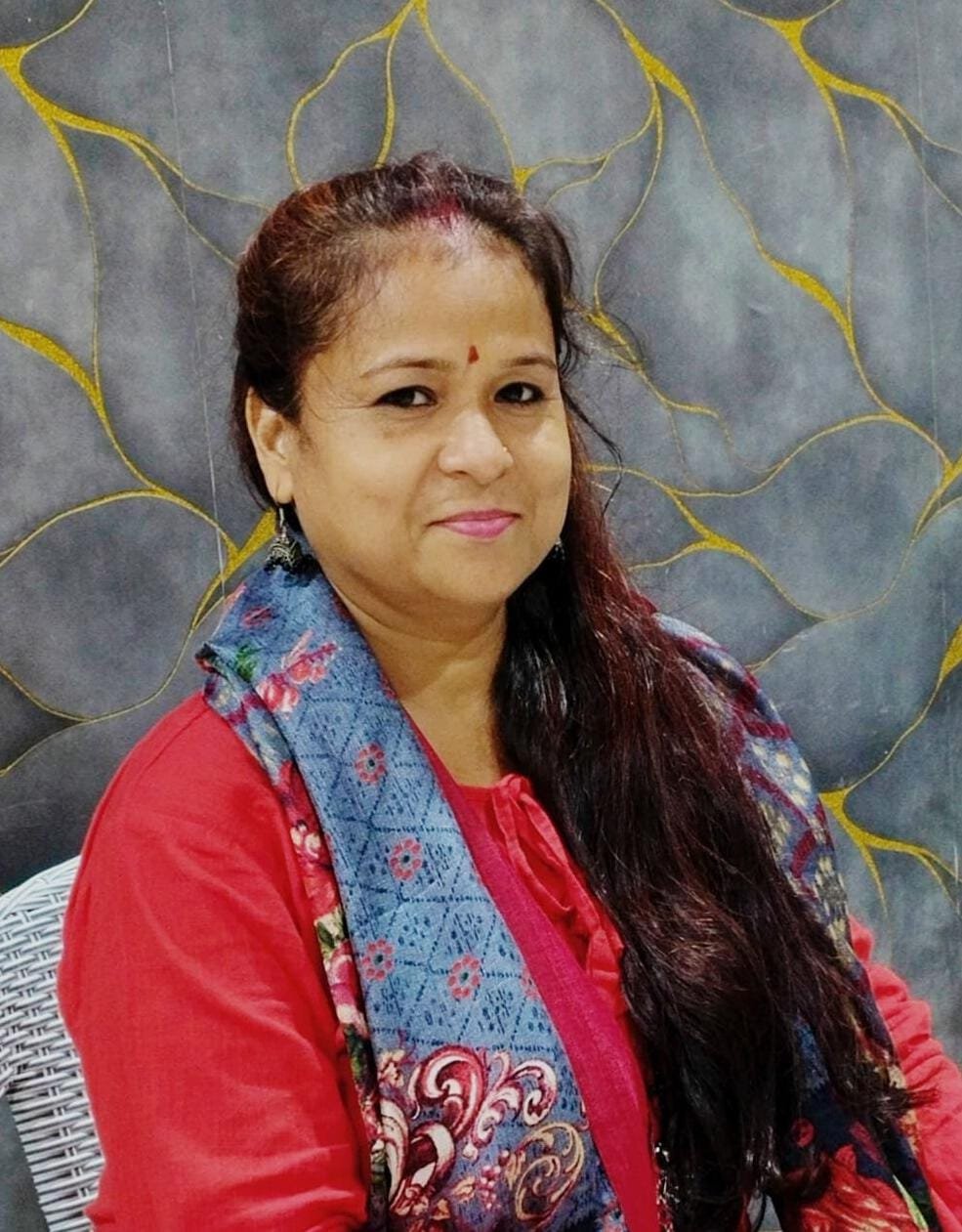
Colombo/Jaipur, July 14,2025
In a vibrant celebration of artistic expression and cultural wisdom, Indian artist Dr. Renu Shahi has drawn deep admiration for her spiritually inspired paintings at an international art exhibition titled “Uncharted”, held at the Curado Art Space in Colombo, Sri Lanka.
Organized by the Rainbow Art Group, New Delhi, this cross-border exhibition featured 49 contemporary artists from six countries, each offering their unique visual interpretations. Amid this diversity, Dr. Shahi’s works stood out — not only for their aesthetic depth but also for their philosophical grounding.
Her three paintings, inspired by verses from the Bhagavad Gita, revolved around the three fundamental qualities of human nature: Sattva (purity), Rajas (passion), and Tamas (inertia). Through rich symbolic imagery and subtle layering, she represented these gunas not merely as abstract ideas, but as divine forces shaping the human experience. Each artwork intertwined color, mythology, and introspection into a single visual meditation.
The exhibition, which ran from July 4th to 10th, was inaugurated by Shanila Alles, Director of Curado Art Space, and curated by Virendra Kumar, the visionary founder of Rainbow Art Group. The group’s mission is to highlight artists who explore Indian culture, spirituality, and heritage through their canvas, offering them a global stage to be seen and heard.
“For us, art is a language that speaks beyond words,” said Kumar. “It transcends geography and unites minds — whether you’re from Jaipur or Jakarta.”

Alongside Dr. Shahi, notable artists such as Banita Rani Singh, Bhaskar Ghosh, Dr. Chetna Agarwal, Manju Saad, Manoj Chakravarty, and Nayana Mevada, among others, showcased their works. Artists hailed not just from India but also from Nepal, Sri Lanka, Qatar, Indonesia, and Belarus. Each piece was a window into the artist’s soul — and some of those windows were so captivating that a few artworks were sold, a testament to the audience’s deep connection with the themes.
Rainbow Art Group has, over the years, emerged as a powerful platform nurturing both emerging and established talent. Its exhibitions reflect a belief that “art needs no passport — it is the purest dialogue between cultures.”
Dr. Renu Shahi’s series served not just as paintings, but as philosophical experiences — introducing Sri Lankan viewers to the timeless teachings of Indian scriptures, not through sermons, but through strokes of color, layers of thought, and a visual silence that speaks louder than words.
Crime
Don’t Hang Nimisha Priya in Yemen: Supreme Court to Hear Plea Today Seeking Diplomatic Intervention to Save Kerala Nurse

Contents
New Delhi, July14,2025
The life of Indian nurse Nimisha Priya, who has been sentenced to death in Yemen, hangs by a thread. With the execution scheduled for July 16, her family and well-wishers are making desperate last-minute efforts to save her.
Today, the Supreme Court of India will hear a critical petition filed by the Save Nimisha Priya International Action Council, urging the Indian government to step in diplomatically and prevent her execution. The matter will be taken up by a bench comprising Justice Vikram Nath and Justice Sandeep Mehta.
What is Nimisha Priya Accused Of?
According to Yemeni court documents, Nimisha, who has been living in Yemen since 2008, was accused of murdering her business partner Talal Abdo Mahdi. Reports allege that after the murder, she, along with another nurse, dismembered his body and disposed of the remains in a water tank.
However, Nimisha’s family strongly denies the murder charges. They claim that Nimisha did not intend to kill Talal. According to them, she only administered an injection to render him unconscious so she could retrieve her confiscated passport. Tragically, due to an overdose, he died — making it an accidental death, not murder.
Pleas for Mercy Rejected
In a heartbreaking turn of events, Nimisha had earlier filed an appeal against the death sentence in Yemen’s Supreme Court, but it was rejected. She also made a mercy plea to the President of Yemen, which too was denied.
A Mother’s Last Hope
Nimisha’s family has made multiple appeals for help — reaching out to both Kerala Chief Minister Pinarayi Vijayan and the central government. CM Vijayan personally wrote to Prime Minister Narendra Modi, urging him to intervene and use all diplomatic channels possible to halt Nimisha’s execution.
The Ministry of External Affairs (MEA) has stated that it is doing all it can to provide support to Nimisha’s family and is in touch with relevant authorities.
Why This Case Matters
This is not just a legal case; it’s a human story of desperation, fear, and a plea for compassion. A mother, a nurse, an Indian citizen – Nimisha Priya is facing death in a foreign land. Her family is fighting to give her a second chance, hoping that diplomacy and humanity will prevail where legal appeals have failed.
As the clock ticks towards July 16, all eyes are now on the Supreme Court of India and the Indian government — will they act in time to stop the execution and bring Nimisha home alive?
Nimisha Priya, Yemen death penalty, Indian nurse, diplomatic intervention, Supreme Court India, Save Nimisha Priya campaign, Kerala news, Talal Abdo Mahdi, Pinarayi Vijayan, Narendra Modi
Health
Samosa, Jalebi, and Laddoo Join the Cigarette Warning List: What’s Behind Health Ministry’s Advisory?

Contents
New Delhi, July 14, 2025
Imagine this — you walk into a government canteen for your morning chai and samosa, and right next to it is a bold warning sign: “Loaded with trans fat and sugar – consume with caution!” No, it’s not a scene from a health documentary — this is soon to be reality in India’s top public institutions.
In a bold move to tackle India’s rising obesity crisis, the Ministry of Health has issued an internal advisory recommending the display of “Oil and Sugar Boards” across cafeterias and dining areas in all central institutions — including AIIMS Nagpur. These boards will clearly state the hidden fat and sugar content in popular Indian snacks like samosas, jalebis, laddoos, vada pav, and even biscuits.
Junk Food: The New Tobacco?
According to health experts, this is a significant shift in India’s approach to food awareness — equating junk food’s health risks with those of tobacco. “This is just the beginning of a future where food labeling becomes as serious as cigarette warnings,” said Dr. Amar Aamle, President of the Cardiological Society of India’s Nagpur chapter. “Sugar and trans fats are the new tobacco. People have a right to know what they are eating.”
The advisory aims to quietly but powerfully inform citizens about the nutritional risks of their beloved snacks, which are often deeply rooted in cultural habits but packed with unhealthy ingredients.
The Numbers Are Alarming
An internal document from the Health Ministry reveals a sobering prediction: by 2050, India could have 449 million people suffering from obesity or being overweight — second only to the United States. Currently, one in five urban adults in India is overweight. The situation is even more concerning among children, with poor dietary habits and lack of physical activity contributing to a surge in childhood obesity.
‘Not a Ban — But an Informed Choice’
“This is not about banning foods,” clarifies Dr. Sunil Gupta, a senior diabetologist. “But if someone knows that a single gulab jamun contains the equivalent of five teaspoons of sugar, they may think twice before reaching for a second.” Health experts believe this initiative is part of a broader campaign to combat non-communicable diseases like diabetes, hypertension, and heart disease — all of which are directly linked to poor dietary choices.
Nagpur will be among the first cities to implement this model. Rather than restricting food items, institutions will display brightly colored indicators with messages like:
“Eat Smart – Your Future Body Will Thank You.”
The Cultural Wake-Up Call
This move isn’t just about calories and fat grams — it’s a cultural wake-up call. India’s traditional snacks, often seen as symbols of warmth and festivity, are now under the scanner for their health implications. While no one’s taking away your laddoo at Diwali, the government now wants you to know exactly what you’re biting into.
With the line between indulgence and health hazard blurring, this step may redefine the way India eats — not by fear, but by awareness. And in the battle against obesity, that awareness might just be our strongest ingredient.
Focus Keywords: obesity in India, Health Ministry advisory, sugar and fat warning, junk food risks, food labeling India, AIIMS Nagpur, samosa warning label, childhood obesity India
SEO Meta Title: India’s Health Ministry Flags Samosas, Jalebis with Sugar-Fat Warnings Amid Obesity Surge
Meta Description: India’s Health Ministry plans ‘Oil and Sugar Boards’ in institutions to warn about high fat and sugar in snacks like samosas and jalebis. Here’s why it’s being called the ‘new tobacco’.
India
Celebrating Young Minds: Vardhman Srikalyan International School Invites Schools to Dr. Mool Chand Sethia Memorial Inter-School Competitions
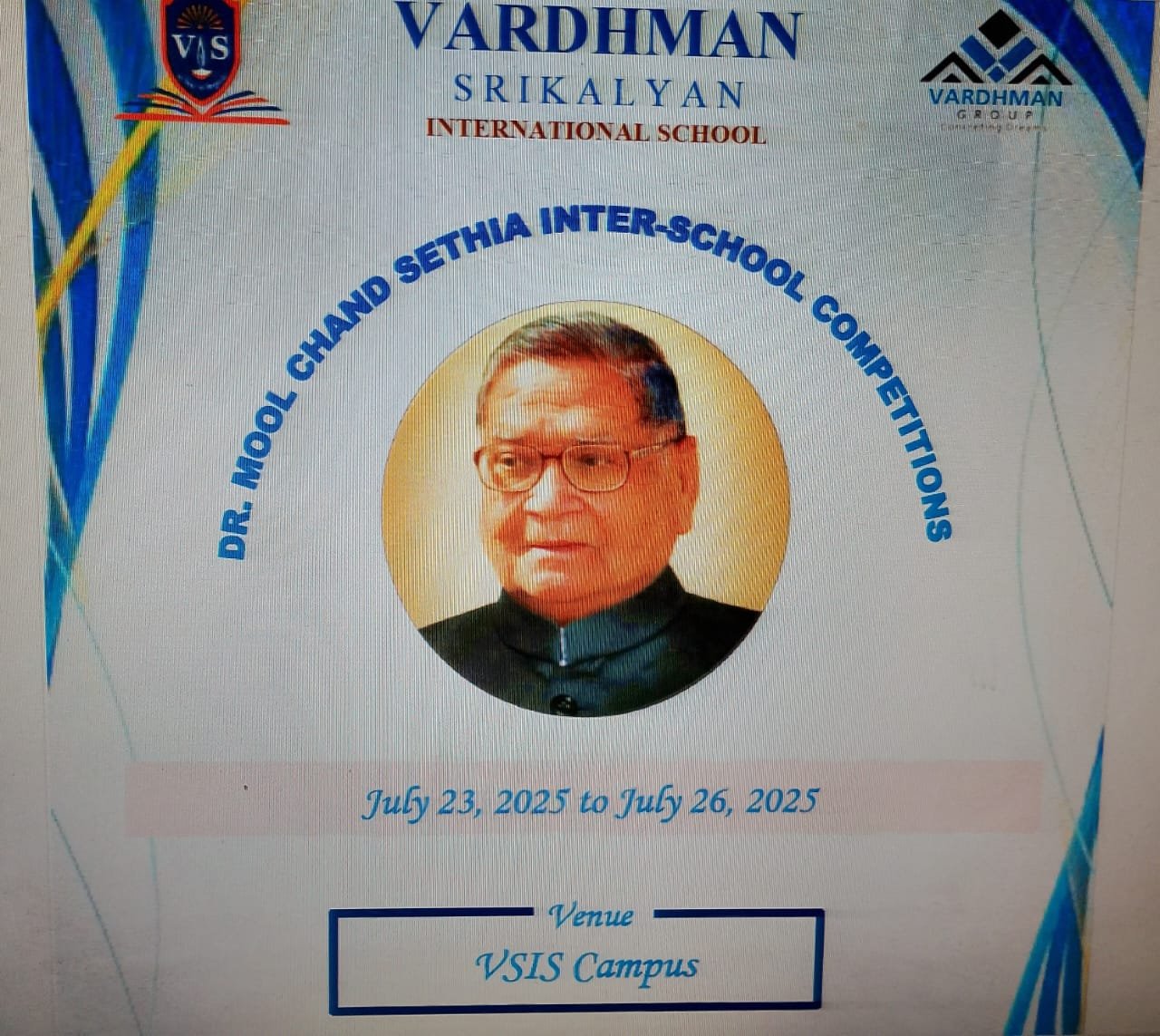
July 14,2025
— A Festival of Talent, Thought & Team Spirit from July 23–26, 2025
In a heartfelt and inspiring move, Vardhman Srikalyan International School, Hathoj, Jaipur, has extended a warm invitation to reputed schools across the region to participate in a prestigious three-day event — The Dr. Mool Chand Sethia Memorial Inter-School Competitions, beginning July 23, 2025. The event will conclude with the much-awaited B.D. Joshi Memorial Debate Competition on July 26, 2025.
The school’s Principal, Mrs. Renuka Joshi, in her message to fellow educators, emphasized that the event is not just a competition, but a celebration of intellect, creativity, and collaborative spirit.
“We aim to create a vibrant, inclusive platform where students can exchange ideas, challenge their boundaries, and celebrate diversity of thought. It’s a rare chance for students to shine beyond the classroom and build friendships that last a lifetime,” she said.
Designed with precision and purpose, the competitions promise to be a confluence of youthful energy and meaningful engagement. Students will get the chance to showcase their talents, explore their speaking and thinking skills, and participate in stimulating dialogue with peers from diverse educational backgrounds.
Schools have been requested to confirm their participation by registering through the official link by July 15, 2025:
🔗 Click here to register
Alongside the registration, a detailed brochure outlining the event structure, themes, and schedules has also been shared to help participants prepare well in advance.
This inter-school meet is expected to bring together bright young minds from various corners of the city — a true testament to the spirit of learning, collaboration, and respectful competition.
Vardhman Srikalyan International School looks forward to hosting a memorable experience — one that plants seeds of inspiration in every student and fosters a culture of excellence.
Accident
Nagaur Horror Caught on Camera: Speeding Car Mows Down Two Pedestrians — One Dies En Route to Hospital

Nagaur, Rajasthan | July 14, 2025
What started as an ordinary morning walk turned into a tragic nightmare for two residents of Sanjay Colony in Nagaur. A high-speed car came barreling down the street and ran over two unsuspecting pedestrians from behind — a scene so brutal that it was caught in chilling detail on a nearby CCTV camera.
The victims, identified as Nathuram and Devisingh, were walking along the roadside when the vehicle struck them without warning. The impact was so severe that both men were thrown onto the road. Shocked bystanders rushed to their aid and immediately informed the police.
Kotwali police arrived at the spot within minutes and shifted the severely injured men to Pandit Jawaharlal Nehru Government Hospital in Nagaur. But the tragedy didn’t end there. As doctors referred both victims to Jodhpur for advanced treatment, Nathuram succumbed to his injuries en route. His body now rests in the mortuary, awaiting post-mortem.
Devisingh continues to battle for his life.
Speaking to the media, police outpost in-charge Gumanaram said, “The car didn’t just hit them — it ran over them. Both men were critically injured. Nathuram couldn’t survive the journey to Jodhpur.”
This wasn’t just an accident. It was a wake-up call. A stark reminder of how a moment’s recklessness can shatter lives.
Locals are demanding stricter traffic surveillance in the area and immediate action against the driver, who is reportedly still absconding.
The CCTV footage has now become a crucial piece of evidence in the investigation, and authorities are using it to trace the car and identify the driver.One moment of speed. Two lives changed forever. One gone too soon.
Education
Passed CA Exam at 71: Retired Bank Manager Tarachand Agarwal Creates History
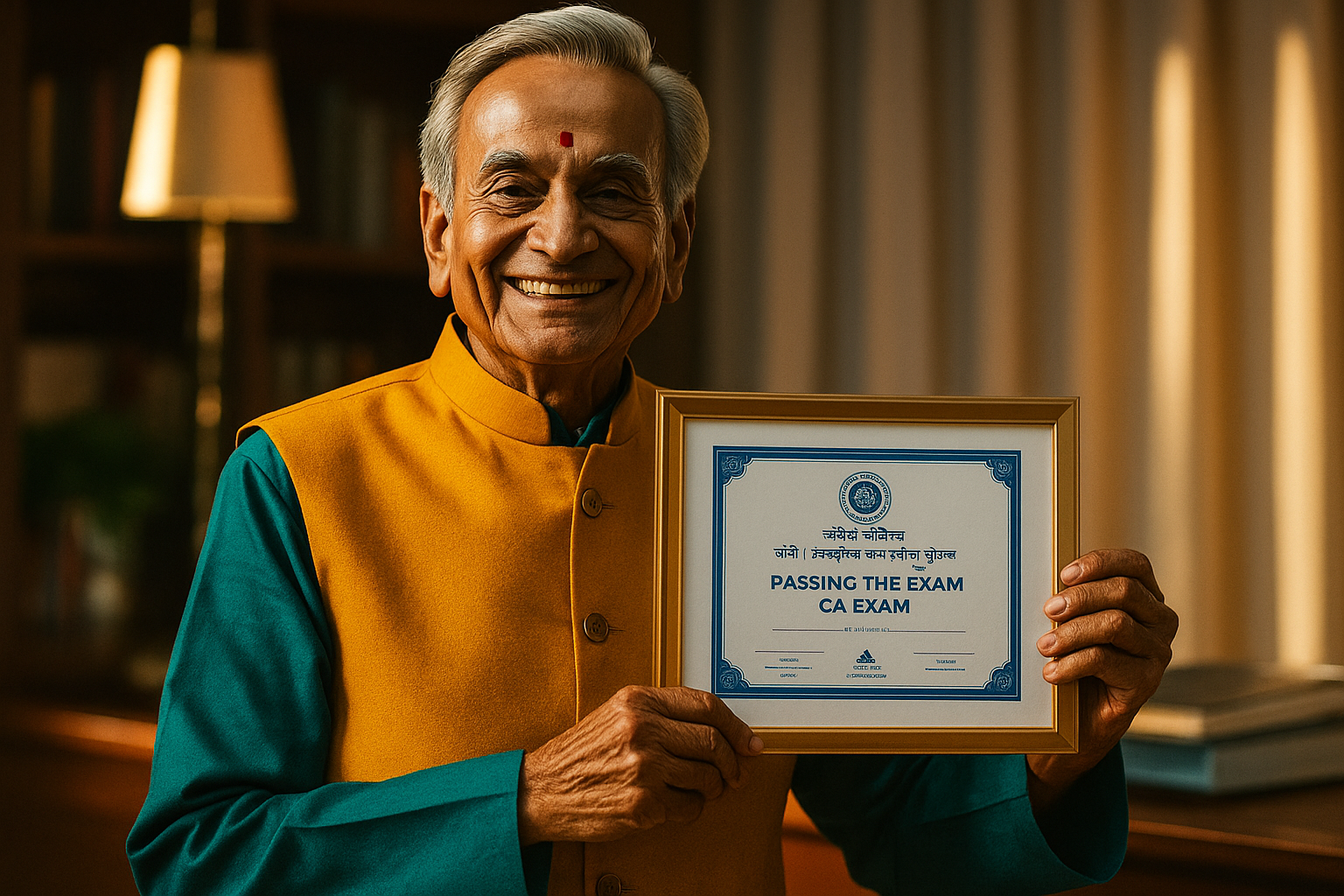
Jaipur, July 12, 2025
“They say dreams have no age — and 71-year-old Tarachand Agarwal has just proved it.” By clearing one of the most prestigious and challenging exams in India — the Chartered Accountancy (CA) exam — he has broken not just age barriers but also inspired a whole generation of youth and senior citizens alike.
Hailing from Rajasthan’s Sikar district, Tarachand Agarwal had retired as a manager from the State Bank of India. But retirement for him wasn’t about slowing down — it was about rediscovering an old dream. Instead of settling into a life of rest, he decided to pursue what he had left behind: becoming a CA. And with the same discipline and dedication as any young aspirant, he started studying again.
Family Became His Strength
His journey was far from lonely. His entire family stood behind him like a rock. His son arranged online study material, his daughter-in-law ensured he ate on time, and his granddaughters made motivational charts to keep his spirits high. The household transformed — it felt just like a student’s home before exams.
Even ICAI Congratulated Him
The Institute of Chartered Accountants of India (ICAI) also acknowledged his incredible achievement with a congratulatory tweet, stating, “Mr. Tarachand Agarwal has shown the nation that learning has no age limit. He is a true inspiration to us all.”
What’s Next for CA Tarachand?
Speaking about his future plans, Tarachand said:
“I want to mentor rural youth who drop out of studies due to financial constraints or lack of self-belief. I want them to know — if I can become a CA at the age of 71, they can achieve anything too.”
Accident
Vadodara Bridge Tragedy: Death Toll Rises to 19, Two Still Missing – Rescue Operations Continue in Mahisagar River
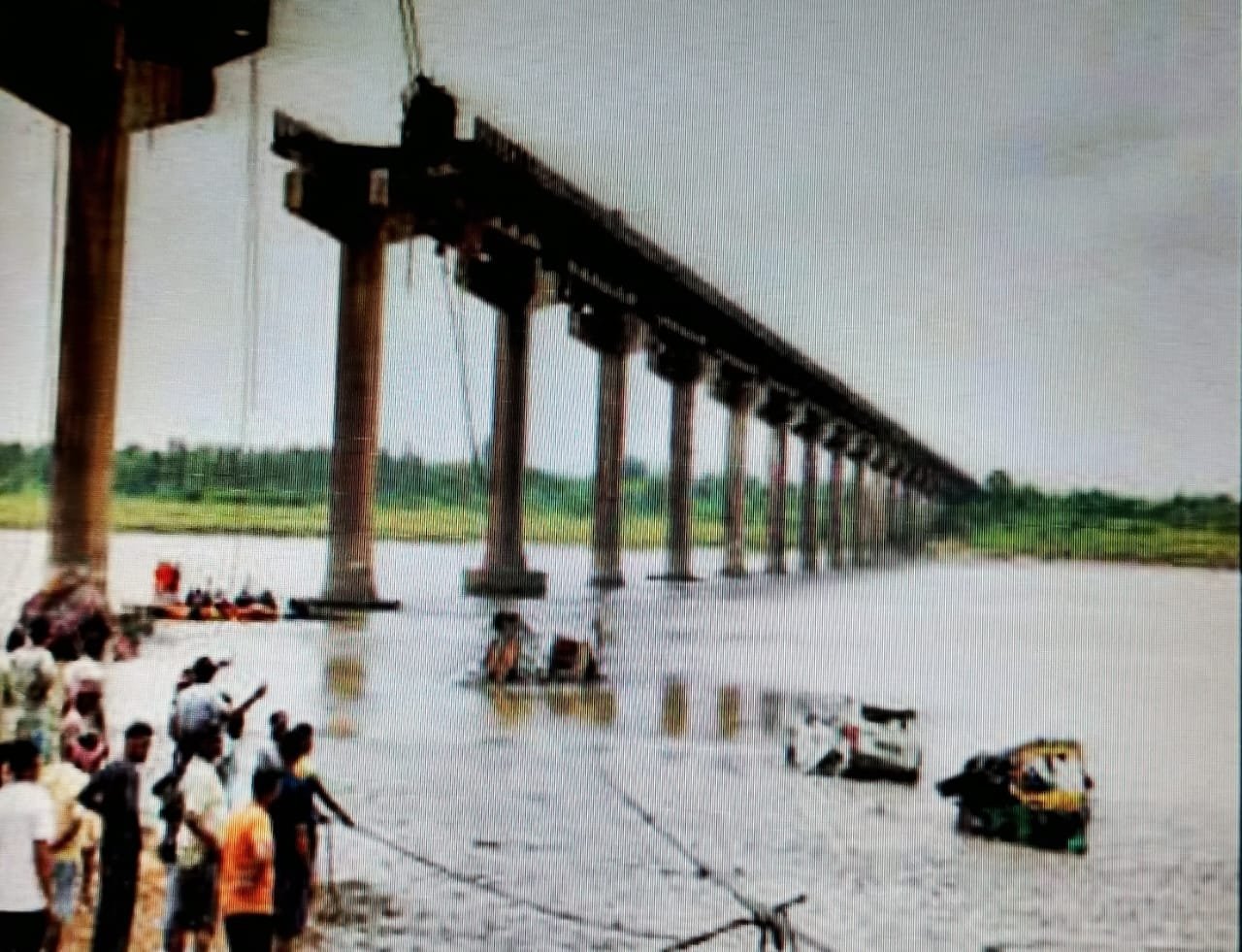
Contents
Vadodara (Gujarat), July 11, 2025
A heart-wrenching incident has shaken Gujarat as the Gambhira–Mujpur bridge over the Mahisagar River in Vadodara district collapsed unexpectedly. So far, 19 people have lost their lives, while 2 individuals remain missing. Rescue teams have been relentlessly working for the third consecutive day in the hope of saving lives and retrieving the missing.
How Did the Tragedy Happen?
The incident occurred on the morning of July 9, when several vehicles were crossing the bridge. Suddenly, a major section of the bridge collapsed into the river, dragging with it two trucks, an SUV, a pickup van, an auto-rickshaw, and two motorcycles. The bridge was nearly 40 years old, and multiple complaints had been made about its deteriorating condition.
Victims Identified, Families Devastated
So far, 18 bodies have been recovered from the debris, while one critically injured person succumbed to injuries at the hospital, taking the total death toll to 19. Among the victims were women, children, and entire families who were out on a pilgrimage for Guru Purnima.
Search Operations Still Underway
Rescue efforts by NDRF, SDRF, and fire brigade teams are still ongoing. The operation is facing major challenges due to the river’s depth, strong current, and over 10 feet of thick mud, making it difficult to access submerged vehicles. Cranes, boats, and divers are being deployed to find the two missing persons.
Government Response and Action
In the wake of the incident, the state government swiftly suspended four engineers and has ordered a detailed investigation into the bridge collapse. The government has also announced financial compensation of ₹2 lakh to the families of the deceased and ₹50,000 for the injured.
Public Outrage and Unanswered Questions
Local residents claim the bridge was already in a dangerous condition, but authorities failed to take timely action. Media reports reveal that just days before the tragedy, a journalist had posted a video highlighting the poor state of the bridge, which went ignored.
This incident has once again exposed the negligence and oversight in maintaining public infrastructure. Behind every number is a grieving family – a shattered home, a mother who lost her child, a father never to return. The need of the hour is strict accountability, immediate structural audits, and long-term corrective measures — so that such a tragedy never repeats itself.

 Education1 month ago
Education1 month agoKota ICICI Bank Staffer Swindles ₹4.5 Crore, Gambles It All on Stock Market

 Bollywood1 month ago
Bollywood1 month agoHousefull 5 Movie Review: Akshay Kumar, Riteish Deshmukh Bring Laughter and Twists in Bollywood’s Biggest Comedy Franchise

 Education3 weeks ago
Education3 weeks ago11 Powerful Reasons Why DAV International Yoga Day Jaipur Uplifted Spirits!

 Cricket1 month ago
Cricket1 month agoBengaluru Chinnaswamy Stadium Stampede: 11 Dead, 33 Injured in RCB Victory Parade Chaos

 Education3 weeks ago
Education3 weeks ago7 Inspiring Highlights of DAV Foundation Day Jaipur Celebration – Amazing Vedic Legacy Revealed!

 Education2 weeks ago
Education2 weeks agoEmpowering Educators: A Three-Day Learning Journey at DAV Centenary Public School, Jaipur

 Credent TV3 weeks ago
Credent TV3 weeks agoVIBGYOR Summer Camp Ends on a High at DAV Centenary Public School, Jaipur

 Election7 days ago
Election7 days agoDAV Centenary Public School, Vaishali Nagar, Jaipur Event Report: Talent Hunt Show








































